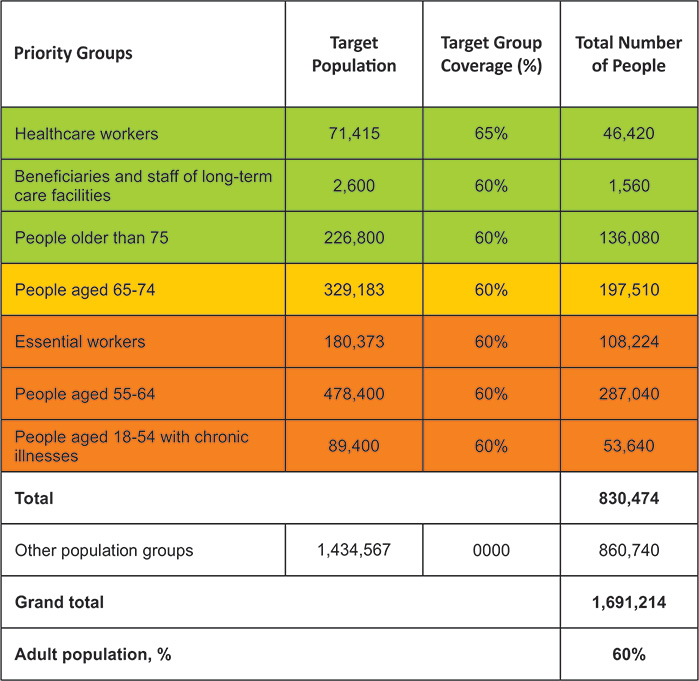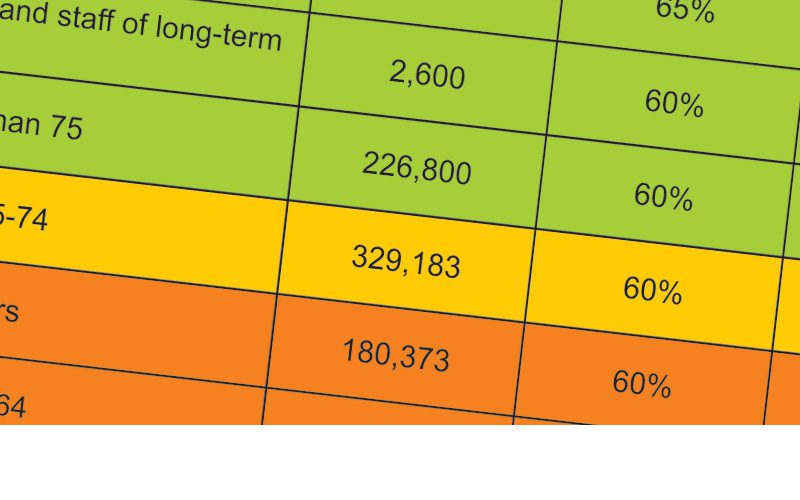Georgia’s plans to vaccinate 60% of the population against Covid-19 by 2022
As the world looks ahead to a Covid-19-free future and with numerous vaccines on the way, the Georgian authorities have already begun talking about how the vaccination process will proceed in the country.
Georgia’s Inter-Agency Coordination Council, the body that has overseen the country’s response to the Covid-19 pandemic, unveiled the official inoculation plan for Georgia on January 21.
The plan is fairly ambitious, aiming to vaccinate 60% of the adult population, or approximately 1.7 million citizens, by the end of the year.
Deputy Health Minister Tamar Gabunia recently announced that the majority of individuals receiving the jab in the early stages will be healthcare workers and the elderly.
The government’s plan prioritizes healthcare workers, aiming to vaccinate 65% of them by the end of the year. Other population groups that will first receive the vaccine include the residents and staff of long-term care facilities, as well as people older than 75. Only once high-risk groups are vaccinated will others get access to the vaccine, including people over 65 years of age, essential workers, and then progressively younger populations and younger people with chronic illnesses.
Deputy Minister Gabunia noted in her recent release that the country will be able to cope technologically with the storage requirements of the vaccines to an extent, given the country already has a public immunization system in place used for routine inoculations, and a temperature-controlled supply chain (a so-called “cold chain”) is also in place. She noted that the largest challenge the country faces in distribution is that two of the western vaccines require very cold storage temperatures and it will be more difficult to distribute to the country’s regions.
“But the vaccines that can be kept at 2 to 8 degrees Celsius (ordinary cooler temperature), they can be distributed through the routine vaccination system that we have already set up on a regional and municipal level,” Gabunia concluded.
To achieve the immunization goal for 2021, as per the government’s plan, the country will need approximately 3,979,300 doses of the vaccine.
Which vaccines will be available, and when?
The development of vaccines has turned into a global race, with researchers, drug manufacturers and governments still trying to gain authorization to push out their vaccines. There are currently about 10 vaccines licensed for use in different countries.
Georgia has prioritized Pfizer-BionTech and Moderna, which have been approved by the U.S. and the EU, as well as the World Health Organization (W.H.O.). The plan is also considering the Oxford-AstraZeneca vaccine, as it has been approved in the UK and is awaiting official authorization from the WHO.
AstraZeneca would simplify things for the country: the vaccine can be kept at 2 to 8 degrees celsius and it is also one of the cheaper options available on the market today.
Despite the country’s readiness to accept the vaccines, as of now it remains unclear which vaccines Georgia will get from the COVAX platform – the global initiative supported by the WHO for researching and distributing the vaccine to the signatory states. The Ministry of Health states that Georgia has already put down part of the payment to secure 1.4 million doses of the vaccine from COVAX, enough for 20% of the population.
The government has been clear that it is not considering the Russian Sputnik V vaccine and notes that the China-made vaccine, although used by a handful of countries, still lacks “transparent and full data“ to support its effectiveness.
Health Minister Ekaterine Tikaradze completely rules out the possibility of importing any vaccines that have not received a high degree of trust from the WHO, and has said that just less than 30,000 doses of the vaccines is expected to arrive by the end of February.
Choosing to focus on Western-made vaccines will cost Georgia time. The head of the National Center for Disease Control and Public Health, Amiran Gamkrelidze, estimates that the vaccination process will really begin in March.
Meanwhile, Azerbaijan has already launched its vaccination campaign earlier this month using the Chinese CoronaVac vaccine.
Armenia, like Georgia, is waiting for its share of vaccines from the COVAX platform but also has not ruled out acquiring the Russian Sputnik V vaccine. The Armenian authorities expect to start their immunization process in early March.
In neighboring Turkey, the large-scale vaccination of citizens continues. The first vaccine was administered just two weeks ago, and since then, the country has managed to inoculate over 1 million people using the Chinese CoronaVac vaccine. Russia also started its mass-vaccination campaign on January 18 with its domestically developed Sputnik V vaccine.
Georgia’s Ministry of Health estimates that vaccinating 60% of the adult population may cost anywhere between 64 million to 158 million GEL, with the large variability resulting from the lack of clarity concerning which manufacturer will be chosen to supply Georgia with vaccines for the mass immunization campaign.
In addition to the doses secured from COVAX, the country’s health officials have repeatedly voiced that they will work directly with manufacturers to receive additional doses.
There are four official scenarios of how vaccination may play out described by the national strategy of immunization, all depending on the type of vaccine that will first become available in Georgia; however, all the proposed scenarios aim to reach the goal of vaccinating 60% of the adult population by the end of 2021.
The first scenario involves getting 1,484,400 doses of AstraZeneca from the COVAX platform, independently importing 200,000 doses of Pfizer, and sourcing the rest of the necessary AstraZeneca doses independently.
The second scenario is quite similar to the first one, but instead of Pfizer, Georgia would need to secure 200,000 doses of the Moderna vaccine.
The third scenario would be implemented if 200,000 doses of any other vaccines that can be kept at 2 to 8 degrees Celsius are received. Moreover, it would also require the 1.4 million doses promised by COVAX and finding an independently sourced AstraZeneca vaccine.
In the fourth scenario, the country would only receive the AstraZeneca vaccine from the COVAX platform and other sources.

How will the vaccination process be conducted?
The different scenarios also vary in logistical complexity, as the Moderna and the Pfizer-BioNTech vaccines require ultra-cold temperatures (-70 to -20 degrees Celsius). For developing countries, and especially the rural areas of those countries, the AstraZeneca vaccine is much easier to store and use, as it does not require complex storage procedures.
According to the government’s plan, should the vaccines that require ultra-cold temperatures become available first, the immunization program will first be conducted in the large healthcare facilities in Tbilisi, Batumi, and Kutaisi.
If Georgia acquires AstraZeneca first, the vaccination process will be much more mobile and will be conducted in the outlying regions as well as the major cities.
Is the population ready for the vaccine?
Getting access to the vaccines and distributing them efficiently is already a major challenge in and of itself for Georgia. Another obstacle for the mass-vaccination program will be the rampant disinformation and conspiracy theories that have taken a strong hold on social media and the public discourse ever since the pandemic began.
The National Immunization Plan approved by the Inter-Agency Coordination Council includes plans for social mobilization, advocacy, and social media campaigns in favor of vaccination, and to dispel disinformation attempts – such as the notorious claims that the appearance of the virus was linked to the emergence of 5G towers, or that the vaccinations are a pretext for tracking and mind-controlling chips.
Georgia has its work cut out for it in this regard: poll results released by the National Democratic Institute (NDI) in cooperation with CRRC Georgia, show that almost half (41%) of the population would prefer themselves and their children to not to get vaccinated, and 17% are still unsure of whether they would prefer to do so. Another 41% is ready to be inoculated.
Such a high number of people refusing or being reluctant to get vaccinated might be alarming for healthcare experts and public authorities. Georgian health professionals have estimated that at the bare minimum, 50-60% of the population has to be vaccinated for herd immunity to develop.
The government intends to launch a fact-based communication plan to educate the public on the benefits of vaccination.
It is yet to be seen which vaccines will arrive in Georgia first, and how the immunization process will play out in the country. Officials, however, are certain that the necessary infrastructure is already in place to ensure the efficient inoculation of the country.
____________________________ ADVERTISEMENT ____________________________


